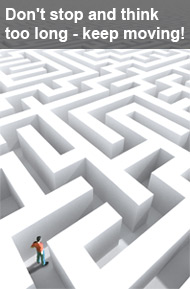Skip to the starting post of this 12 part series.

“Avoid analysis paralysis. Chaotic action is preferable to orderly inaction.” (From this list.)
It takes a brave business, or a smaller business, to truly do chaotic action well. Orderly inaction is safer. It is following the rules and absolving responsibility to the prevailing business processes.
The reason why smaller businesses can be more innovative, and certainly more agile, is the fact that they often of little choice but to think and act on their feet. This chaotic action breeds creative thinking. Don't stop and think too long - keep moving! (Not thinking at all - which is easy to do - doesn't work of course.)
Analysis paralysis is prevalent for several reasons. The need to justify all decisions based on supposedly rational and unbiased numbers. Arse-covering by hard facts and data – for fear of making mistakes.
Analysis paralysis is also fuelled by over-regulation and the attendant over-reporting. Every time we encountered an Enron, an HIH or a Lehman Brothers, the simplistic reaction is to impose more reporting – as if more paperwork alone can prevent bad behaviour. We do not look deeper into the root causes – for example how our myopic focus on making more money quickly at any cost could contribute to the selection of destructive and psychologically-unsound persons (such as narcissistic psychopaths) as leaders in large corporations, who subsequently causes these corporations to implode.
(But of course we forget that the majority of business people are nice, every day trust-worthy individuals. They are out mothers, fathers, brothers and sisters. The significant impact of a Lehman Brothers, together with a sensationalistic/fear-mongering media, serves to spray distrust about all business people.)
Over-reporting also gives many businesses an excuse to be busy, and thus to avoiding dealing with trickier issues like an eroding customer base, or declining customer morale.
The fear of trusting people, the fear of disappointment when the people we trust fail us, the fear of risk (analysis gives us the illusion of being able to manage risk), the fear of trusting our gut feel and innate judgements – these fear keeps us rooted in analysis paralysis.